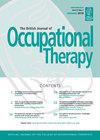Adopting new habits and routines in response to COVID-19 lockdown disruptions: A qualitative study
IF 1.3
4区 医学
Q3 REHABILITATION
引用次数: 0
Abstract
Introduction:COVID-19-related restrictions resulted in changes to time use and occupational participation, impacting individual and collective well-being. This study addressed a knowledge gap concerning the adaptive process during periods of occupational disruption. We explored the experience of occupational disruption and how people managed disruption during the COVID-19 pandemic.Methods:We used a qualitative descriptive approach and interviewed 18 participants of a larger survey study of time use during the COVID-19 pandemic undertaken around a medium-sized city in Canada. Transcript analysis was conducted inductively using conventional content analysis.Findings:Two overarching themes were constructed during data analysis: The Disruption Experience and Adopting New Habits and Routines. In the face of disruption, participants described a sense of loss and disconnection, and challenges with time management. Establishing new habits and routines required new learning associated with increased time and flexibility, connecting with others and health and wellness.Conclusion:During changing pandemic restrictions, participants expressed a sense of loss, disconnection and time management challenges associated with occupational disruptions, but also described ways they adapted, improving their health and well-being. Strategies identified through this work may be used to enhance adaptation during disruptions. Future research should explore differences in adaptation, among more diverse populations.针对 COVID-19 封锁中断事件养成新的习惯和常规:定性研究
导言:与 COVID-19 相关的限制导致了时间利用和职业参与的变化,影响了个人和集体的福祉。本研究填补了有关职业中断期间适应过程的知识空白。方法:我们采用了定性描述的方法,在加拿大的一个中等城市采访了 18 名参与 COVID-19 大流行期间时间使用情况大型调查研究的人员。研究结果:在数据分析过程中,我们发现了两个最重要的主题:研究结果:在数据分析过程中构建了两个主题:中断体验和养成新习惯和常规。面对中断,参与者描述了一种失落感和断裂感,以及时间管理方面的挑战。结论:在大流行病限制不断变化的过程中,参与者表达了一种失落感、断裂感以及与职业中断相关的时间管理方面的挑战,但也描述了他们适应的方式,从而改善了他们的健康和福祉。通过这项工作确定的策略可用于在中断期间加强适应。未来的研究应探索更多不同人群在适应方面的差异。
本文章由计算机程序翻译,如有差异,请以英文原文为准。
求助全文
约1分钟内获得全文
求助全文
来源期刊

British Journal of Occupational Therapy
REHABILITATION-
CiteScore
2.20
自引率
15.40%
发文量
81
审稿时长
6-12 weeks
期刊介绍:
British Journal of Occupational Therapy (BJOT) is the official journal of the Royal College of Occupational Therapists. Its purpose is to publish articles with international relevance that advance knowledge in research, practice, education, and management in occupational therapy. It is a monthly peer reviewed publication that disseminates evidence on the effectiveness, benefit, and value of occupational therapy so that occupational therapists, service users, and key stakeholders can make informed decisions. BJOT publishes research articles, reviews, practice analyses, opinion pieces, editorials, letters to the editor and book reviews. It also regularly publishes special issues on topics relevant to occupational therapy.
 求助内容:
求助内容: 应助结果提醒方式:
应助结果提醒方式:


